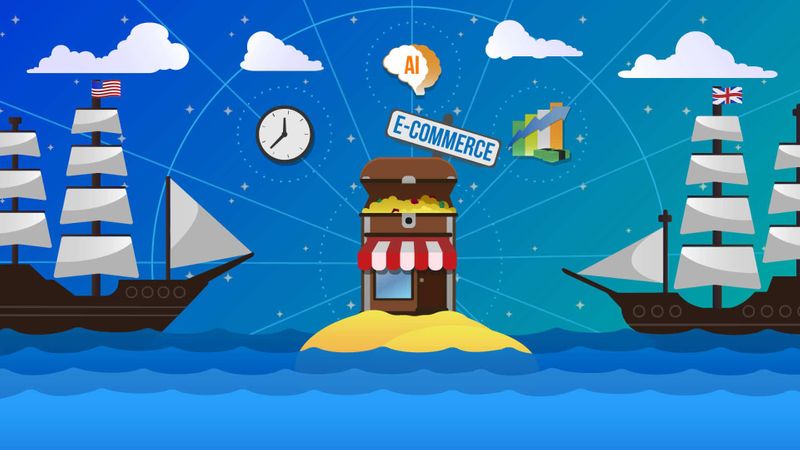E-commerce Future in UK and USA
READ WHOLE ARTICLE

Do you want your business to join the e-commerce breakthrough? If you don’t, you may be passing up the projected $5 trillion in e-commerce sales anticipated from the world market in 2022.
They are the US and UK, alongside with China, where are the biggest e-commerce markets and the most perspective future of ecommerce industry.
Behind these certainties are a great many examples of overcoming stories: small business owners and tiny startupers in the USA and UK have been revealed online by buyers all over the world. With shrewd approaches, the quantities of these transoceanic online exporters can develop into millions.
E-commerce market in the UK and USA
The e-commerce blast isn’t making life simpler for customers familiar with heading to Walmart or meandering around Harrods. Also it is changing the players and potential outcomes in U.S. also, UK’ foreign trade. Most strikingly, it is having a chance for small companies to trade, improve to international sellers, and craft their global supply chains even using a mobile devices.
In America alone, all transactions on the web increased from $4 trillion in 2007 to over $7 trillion in 2014, comparable to 33% of the U.S. economy. The offer of etail of all retail was 13 percent in 2016 in the U.S., and 15 percent in the UK. By 2021, the estimation of UK’s web based business is assessed to be £69 billion, up from £10 billion of every 2014. The B2B (Business to Business where organizations pitch to one another) e-commerce markets are estimated to be much more prominent than Business to Customer or B2C deals.
The contrast among online and offline organizations’ chances to export are amazing:
- Upwards of 96% of startups and small businesses in United States that sell on eBay also export – and trade on about 16 markets, rather than the typical U.S. offline companies of which fewer than 5% export, and those that export sells on about one market, commonly Mexican or Canadian.
- Speaking about British businesses selling on eBay, 94% also export rather than the 13-25 % of offline merchants, counting more estimate, that export. Online sellers export on about 20 markets, firstly to the U.S.
Online merchants export more because in light of the fact that the Internet annihilates geographic distance that for quite a long time has shortened perceivability, trust and trade between small purchasers and merchants situated far apart. As opposed to perusing items in the shopping center, customers would today be able to utilize ecommerce platforms to access the worldwide market of products and sellers – and use platforms’ star ratings systems and client surveys to increase moment feel for the merchants’ reliability and quality, perspectives that in the offline economy will in general take substantially more research and cycle between the purchaser and dealers.
5 Trends in E-commerce Website Design
Trends in online business area
In fact of e-commerce area is exploding, online sellers and businessmen prone to make new innovations and crafts for better customer engagement. Moreover, the most successful of them have already led fresh trends:
- Personalize and Customize
Contrasted with conventional retail shopping, ecommerce stores need up face-to-face individual interaction. Web stores don’t have a retail assistant who can suggest items dependent on your interests, tastes, and inclinations.
To imitate this experience, online business organizations influence personalization openings all through the shopping venture. Using personal online information such as search queries, page visits, and purchase history, brands change their web shops to best serve the customer’s wishes and demands. For example, login to your account in Amazon. You’ll discover suggested items dependent on your past buys, advertisements custom fitted to your inquiry history, and promoting copy talking legitimately to you. Anticipate that more brands should go with the same pattern as personalization innovation winds up simpler to coordinate into ecommerce sites.
 |
In 2021 robots will take over ecommerce shops. All things considered, robots, for example, chatbots and computerized reasoning (AI) intended to improve a client’s general shopping knowledge. Artificial Intelligence assistants can deal with various assignments ordinarily doled out to a human, for example, overseeing stock or taking care of request. These digital assistants complete different procedures, saving time for you to concentrate on different parts of maintaining the business. |
- B2B E-commerce Is Bursting Out
E-commerce was not only for B2C brands. B2B businesses are using them too. It’s even been anticipated that B2B e-commerce deals will expand worldwide to $7.7 trillion by 2021.
In a review of 500 B2B companies, BigCommerce found that 82% acknowledged requests and installment through their site, further demonstrating the development of internet business in B2B enterprises pushing ahead.
E-commerce personalization does some amazing things for B2B customers also. Research found that 49% of B2B purchasers wanted personalization while looking for online providers with whom to have a connection.
- Visualize your product in interactive mode
We really need to interact with a product before we focus on a buy. Web feedbacks and reviews aren’t sufficient. We expect to see the item, feel it, grasp it, and evacuate all sentiments of uncertainty before buying.
While we were once happy with superb pictures of items, the present innovation gives us a chance to utilize computer generated reality, 3D imaging, augmented reality, and more to communicate with an item from the solace of our PC or cell phone
Indeed, even e-commerce item videos have developed to be all the more captivating. What was at one time a gooey infomercial has changed into a vivid, 360-degree internet shopping knowledge.
For example, Converse offers clients the capacity to customize their shoes on the web. Amid this procedure, clients assemble their very own plan through turning, flipping, and focusing in on the shoe.
Preceding presenting their order, clients have full certainty they’ve manufactured the accurate shoes they want on account of the interactive idea of the procedure.
- Provide More Custom Retail Experiences
While things above all work to imitate that real feeling of purchase, no innovation can genuinely supplant everything about an in-store experience.
In light of this, brands are making vivid retail experiences to next drive sales, contract more sales reps, and create enduring client connections. For example, Amazon is opening stores, named “4-Star,” everywhere in the USA. At these stores, you can cooperate with Amazon’s gadgets and top items face to face. Different brands benefitting from this new reality are brick and click stores, which consolidate a brought retail and e-commerce experience. These brands open retail shops with less area and representatives, yet an increasingly customized and interactive in-store visit.
How to make a choice on an e-commerce platform
If you decided not to lose a chance of getting a benefit from such lucrative tendency, it’s time to think over the system you will work with. Choosing a platform for an online store is not just a comparison of e-commerce systems on the market, but a thorough analysis of web platforms from various vendors and the evaluation of ready-made e-commerce applications for a variety of parameters.
At the first stage, it is necessary to assess what the online store will be in terms of load (traffic, conversion, depth of viewing the site) and business (plans for the development of the online commerce channel and financial capabilities of the organization). |  |
The requirements for the future online store at the planning stage will depend on: the budget of the e-commerce project, the functionality of the site, the scalability and flexibility of the system, the timing of the project, the cost of development, the cost of licenses, the cost of technical support and development of an online store in the future, etc.
Shopify Is The Future of E-Commerce
Final Words
To start your e-commerce journey, you can first research the most famous and reliable e-commerce platforms, that is, Woocommerce, Etsy, Shopify and Magento. These services differ in their features, technologies, security level and ways to build an online store. All the merchants pick up the platform that matches their needs and will be more convenient for their customers. Multi-Programming Solutions has outstanding experience in developing and launching online stores based on various stages. Its team keeps a set of profitable projects under its belt. We can’t predict the future but are ready to cooperate with you to bring your idea to life.
Contact us to know the details!

36 Kings Road
CM1 4HP Chelmsford
England


